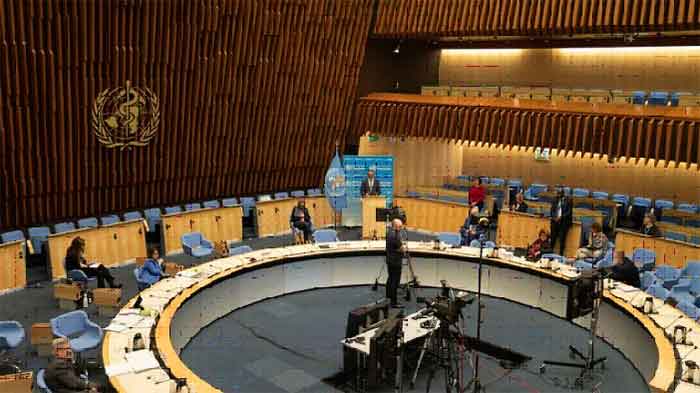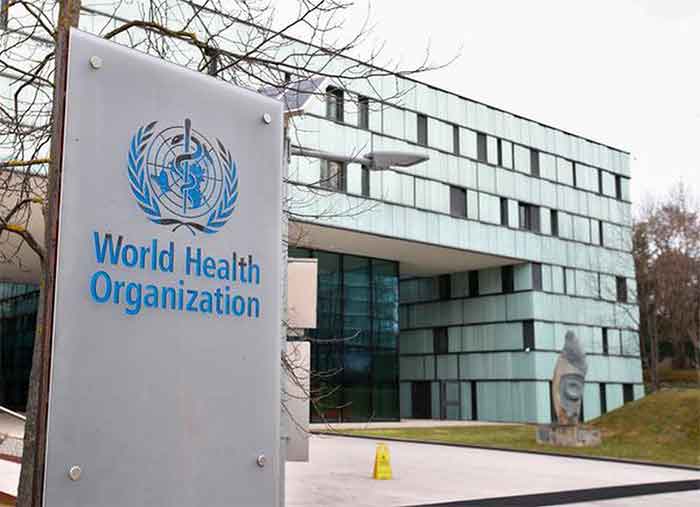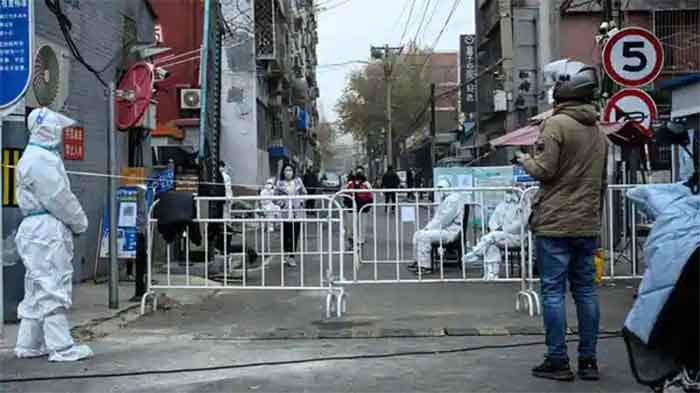
The above is the title of news release by WHO. The two-day meeting of the 73rd World Health Assembly (WHA) was held in Geneva on May 18-19, discussed Covid-19 and how the world is coping with that. Even as the media in India is engaged 24×7 on Covid-19, this historic session was given poor coverage, and many of those that covered gave highly distorted reports, with an anti-China bias. wion.com, for instance, led the misinformation: WHA meet came to an end …with considerable scrutiny of China …Distorting China’s announcement of help to the tune of $ 2 billion, especially meant for developing countries, it said: Many will see it as blood money given that the world sees China as the source of the crisis.Most of Indian TV channels are using wion.com as their source.
The WHA is the decision making body of the WHO, held annually in Geneva, Switzerland, is attended by WHO’s 194 member states to discuss health agendas set by the body’s Executive Board, set new goals and assign tasks to fulfill these goals. Due to Covid-19, the Assembly was held virtually this year, and has been fit into a two-day schedule from a three-week schedule.
“Let our shared humanity be the antidote to our shared threat.” – Dr Tedros, said the brief News release by WHO from Geneva 19 May 2020:
The resolution, co-sponsored by more than 130 countries, was adopted by consensus.
It calls for the intensification of efforts to control the pandemic, and for equitable access to and fair distribution of all essential health technologies and products to combat the virus. It also calls for an independent and comprehensive evaluation of the global response, including, but not limited to, WHO’s performance.
As WHO convened ministers of health from almost every country in the world, the consistent message throughout the two-day meeting—including from the 14 heads of state participating in the opening and closing sessions —was that global unity is the most powerful tool to combat the outbreak. The resolution is a concrete manifestation of this call, and a roadmap for controlling the outbreak.
In his closing remarks, WHO Director-General Dr Tedros Adhanom Ghebreyesus said “COVID-19 has robbed us of people we love. It’s robbed us of lives and livelihoods; it’s shaken the foundations of our world; it threatens to tear at the fabric of international cooperation. But it’s also reminded us that for all our differences, we are one human race, and we are stronger together.”
The World Health Assembly will reconvene later in the year.
Attempts to isolate and damn China and WHO ended in failure
Thus all attempts by a group led by USA and President Trump, and including QUAD and Modi’s India, to isolate and damn China and WHO ended in failure.
The Indian media projected as if a resolution blaming China and demanding an international probe on how it manipulated the origin, data, misinformation and handling of Covid-19 was adopted. The news Release has none of it. The resolution, WHO said, co-sponsored by more than 130 countries, was adopted by consensus.
ThePrint.in, 18 May, 2020 reported: In a decisive shift in stance, India has joined 62 other countries in backing a draft resolution that seeks to probe the Covid-19 outbreak and its origin even as China continues to vehemently resist such a move.
While it is true that India joined hands, as part of QUAD, with EU and others who initiated the move, China’s role was otherwise, as can be seen below:
indiatoday.in May 20, 2020 reported:
The EU-draft resolution which was co-sponsored by EU member states and Australia finally saw the support of close to 140 member states, including China, before it was adopted on Tuesday at the 73rd World Health Assembly (WHA).
“China has co-sponsored the draft resolution backed by 120 countries. We hope the draft resolution can be adopted by consensus at the 73rd WHA and will be implemented accurately and comprehensively,” Chinese foreign ministry spokesperson Zhao Lijian said during the daily briefing on May 19.
The agenda of the WHA’s first-ever virtual session was to discuss and adopt the resolution in finding a way to battle the global health pandemic that has claimed over 3,00,000 lives and infected 4.8 million people worldwide.
The resolution does not mention China, or its Lab as an alleged source. Instead,
The resolution has called on the WHO Director-General, Tedros Adhanom Ghebreyesus to “continue to work closely with the World Organisation for Animal Health (OIE), the Food and Agriculture Organization of the United Nations (FAO) and countries, as part of the One-Health Approach to identify the zoonotic source of the virus and the route of introduction to the human population, including the possible role of intermediate hosts.”
Further, the resolution states, “Initiate, at the earliest appropriate moment, and in consultation with Member States, (1) a stepwise process of impartial, independent and comprehensive evaluation, including using existing mechanisms, (2) as appropriate, to review experience gained and lessons learned from the WHO-coordinated international health response to COVID-19.”
Germany apparently demarcated itself : Chancellor Angela Merkel said “no country can solve this problem alone” and backed the WHO’s efforts to combat the outbreak. Merkel added that countries should “work to improve procedures” and the WHO should ensure its funding is sustainable.
White House trade adviser Peter Navarro said in a TV appearance that the China sent “hundreds of thousands of Chinese on aircraft to Milan, New York and around the world to seed” it.
On May 18 night Trump posted on Twitter his letter to the WHO Chief that accused the WHO of being “curiously” insistent on praising China and for its “alleged transparency”.
On May 19, he threatened to permanently cut funding to the WHO. Trump put the WHO DG on a 30-day notice seeking action within that time period for USA to resume funding, suspended last month, WHO.
The resolution of May 19 made no mention of China, set no time frame, is not binding. Instead it called for nations to commit to ensuring “transparent, equitable and timely access” to any treatments or vaccines developed against Covid-19.
China announced a $2 billion donation to the UN
On May 18 Monday, China’s Chief Xi Jinping announced a $2 billion donation to the United Nations, which is over twice the amount the US contributed before Trump cut off funding. It also offered to set up hospitals and health infrastructure in Africa.
Speaking at the opening ceremony of the WHA, Xi said China “supports” the idea of a comprehensive review of the global response towards Covid-19 after it was brought under control. The focus now should be to tackle the pandemic and save lives.
In his opening remarks Dr.Tedros promised to initiate an independent evaluation at the earliest so that recommendations can be made to improve national and global pandemic preparedness and response. At the same time, stressed that such an evaluation must encompass the entirety of the response by all actors. By implication he rejected the alleged complicity of China and WHO, as blamed by Trump:
Dr.Tedros remarked, “WHO is committed to transparency, accountability and continuous improvement. For us, change is a constant. In fact, the existing independent accountability mechanisms are already in operation, since the pandemic started. The Independent Oversight Advisory Committee has today published its first report on the pandemic, with several recommendations for both the Secretariat and Member States.” He added, “In that spirit, we welcome the proposed resolution before this Assembly, which calls for a step-wise process of impartial, independent and comprehensive evaluation. To be truly comprehensive, such an evaluation must encompass the entirety of the response by all actors, in good faith.”
Interestingly, while China endorsed the resolution, the US did not object to its adoption, but expressed certain reservations, in a written explanation of its position:
While the US applauded the call for an “impartial, independent, and comprehensive review of the WHO’s response”, it disassociated itself from the language in some areas of the resolution related to “access to abortion” and language in the “World Trade Organization (WTO) Agreement on Trade-Related Aspects of Intellectual Property (TRIPS) and the Doha Declaration of 2001”
“We do not accept references to “sexual and reproductive health,” or other languages that suggests or explicitly states that access to abortion is included in the provision of population and individual level health services,” the written statement said.
The WHA also elected ten new member states in the executive board of the WHO. India was one of the ten nations to join the executive board of the World Health Organisation for a period of three years.
The other new members include South Korea, Russia and UK.
The WHO Executive Board comprising 34 individuals holds two meetings annually — the first one in January and a shorter meeting in May — immediately after the World Health Assembly.
At the 147th session of the executive board on May 22, the election of the chair, vice-chairs, and rapporteurs will take place. India will take over as chairperson. Currently, Dr. Hiroki Nakatani of Japan is the Chairman of the WHO Executive Board.
There were rumors in social media that China knew medicines for Covid-19, but did not share it to the world. This was refuted by Xi Jinping at the meet. See this report by a Latin American news agency:
‘China responsibly fights against Covid-19,’ assures Xi Jinping
Beijing, May 18 (Prensa Latina) President Xi Jinping assured this Monday on the 73rd World Health Assembly that China has been responsibly fighting against the Covid-19 disease with transparency since Wuhan’s outbreak, detailing proposals to overcome the current pandemic.
On the inauguration of the virtual meeting, the president indicated that in a timely and open manner, his country provided the World Health Organization (WHO) and other nations with the information collected on the SARS-CoV-2 coronavirus, the cause of pneumonia.
‘We share with the world the accumulated experience of control and treatment, without reservation. We have done everything possible to support and assist the most needy States’, affirmed Xi, unfolding China’s efforts to contain the disease.
In that sense, the leader promised that China will make available to all countries if any of its vaccines, currently under clinical trial, prove to be effective against Covid-19.
The president also mentioned Beijing’s plans to work with the G-20 on debt suspension initiatives to very poor countries and the willingness to be one of the global providers of health materials with rapid transportation and customs’ permits.
Xi Jinping announced that by 2022 China will allocate 2 billion dollars to support the socioeconomic development of pandemic-affected States and establish a mechanism for Chinese hospitals to collaborate with 30 healthcare centers in Africa to strengthen the response to communicable diseases.
He advocated that WHO always lead the global fight against Covid-19 and strengthen governance in public healthcare.
Another report from Zurich, in ThePrint.in said:
China pledged to make its coronavirus vaccine a global public good once one is available, with President Xi Jinping seeking to defuse criticism…Xi’s comments come amid growing concern that countries will put national interests first in the quest for a protective shot, seen as the key to getting economies moving again.
“Covid-19 vaccine development and deployment in China, when available, will be made a global public good, which will be China’s contribution to ensuring vaccine accessibility and affordability in developing countries,” Xi said in his speech to the WHA.
Among the dozens of vaccine projects under way worldwide, China has five candidates already in human trials. More will enter such tests next month.
China acted with transparency and responsibility all along, and provided information to the WHO and countries in the most timely fashion,said Xi. China will provide $2 billion over two years to support the fight against the pandemic, especially in developing countries, he said.
The European Union’s own proposal to the assembly struck a similar tone, highlighting the need for all countries to have “unhindered timely access” to shots, medicines, diagnostics and any other technologies needed to fight the pandemic.
The WHO said this month that it’s considering a new mission to China to seek the source of the virus. International experts were part of a previous delegation to the country in February, at the height of China’s outbreak.
“We need to pursue international cooperation on testing methods, clinical treatment, and vaccine and medicine research and development,” Xi said. “We need to continue supporting global research by scientists on the source and transmission of virus.”
The WHO has also faced criticism from the Trump administration that it was too deferential to China over its handling of the crisis. The EU’s draft resolution, backed by countries including Brazil, Japan and Canada, suggested evaluating the WHO’s response to the pandemic “at the earliest appropriate moment.”
Director-General Tedros Adhanom Ghebreyesus said he welcomed calls for an impartial independent and comphrehensive evaluation.
“It must encompass the entirety of the response by all actors in good faith,” he said in a speech. “So I will initiate an independent evaluation at the earliest appropriate moment to review the experience gained and lessons learned and to make recommendations to improve national and global pandemic preparedness and response.”
India to chair the executive board
The WHA also elected ten new member states in the executive board of the WHO. India was one of the ten nations to join the executive board of the WHO for a period of three years.
The other new members include Botswana, Colombia, Ghana, Guinea-Bissau, Madagascar, Oman, Republic of Korea, Russia, and the UK.
The WHO Executive Board comprising 34 individuals holds two meetings annually — the first one in January and a shorter meeting in May — immediately after the World Health Assembly.
At the 147th session of the executive board on May 22, the election of the chair, vice-chairs, and rapporteurs will take place. India’s Dr Harsh Vardhan will take over as chairperson. Currently, Dr. Hiroki Nakatani of Japan is the Chairman of the WHO Executive Board.
US lobby tried to push Taiwan into the WHA, and India was sought to be roped in.But Taiwan did not make it as an observer to the World Health Assembly.
All Board members are highly qualified individuals in the field of health. The election of the member states is for three years and the Board meets at least twice a year. It is responsible for finalising the decisions and policies of the Health Assembly.
The post is held by rotation for one year among regional groups. Each member of the board is designated by a member state elected to do so by the World Health Assembly.
SIGN UP FOR COUNTERCURRENTS DAILY NEWS LETTER
















































